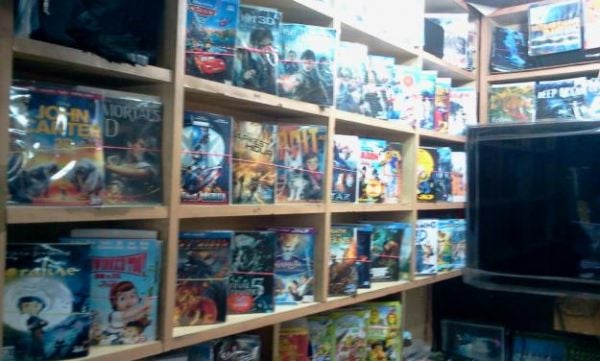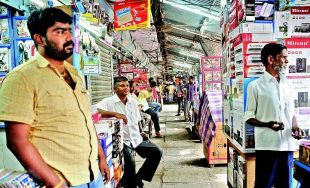Sellers of Pirated DVDs Struggle to Stay Relevant in the Digital Age

DVDs, both foreign and domestic, for sale at Burma Bazaar.
About a month ago, popular Tamil star Vijay’s latest film Thalaivaa (“Leader”) was supposed to hit theaters. His fans had been waiting for the film for months, following every twist and turn of the shooting process in a state where cinema is like a religion. The film wasn’t released in the 500 theaters in Tamil Nadu and Pondicherry, but opened as scheduled around the world. And within two days, pirated DVDs were available on the black market.
Whether you want old classics or the latest films, the black market is where you’ll find them in Chennai. Pirated DVDs cost less than Rs 50 a piece (about 7 cents) while the originals are priced between Rs 300 and Rs 700 ($5 to $10) per disc depending on whether it’s an English or a local-language film. And one of the main markets for pirated discs is Burma Bazaar in north Chennai, one of the older parts of the city, close to Beach Station and Fort St. George, the original outpost of the British who founded Madras, now known as Chennai.
Burma Bazaar began life as a makeshift market in the 1960s, set up by repatriates from Myanmar who were waiting for the Tamil Nadu government to process their papers and help them resettle. Close to 150,000 Tamils were repatriated to India between 1964 and 1989 as the military junta tightened its grip over what was then Burma.
Running out of cash and hope, many of the repatriates set up stalls near Chennai’s Beach Station to sell their belongings and make money for food. Passers-by and government employees from the very offices the repatriates were petitioning bought their toys, trinkets and even footwear and extra clothing. Word of the bargain market spread, and business picked up.
Over time, the motley group of stores morphed into a market selling smuggled goods ranging from Casio watches and Samsonite suitcases to Vochelle chocolates and wind-up toys — simple pleasures that weren’t easily available in the then-tightly regulated economy of India. In the 1980s, the bazaar became the hub for electronic gadgets. The electronics were all smuggled in and authorities pretended not to notice the thriving illegal trade.
Slowly, the government set up stalls and leased them out, hoping to put the shopkeepers on the straight and narrow, but that didn’t seem to happen. The goods sold are still teetering on the wrong side of the law and rents aren’t paid to the corporation on time. “Each shop is about 200 square feet and the rent is reasonable, but most of the shopkeepers have arrears running to years,” says an official.
During the 50-odd years in which the bazaar has grown to more than 600 shops, it has adapted to the demands of the market. When liberalization eased up import controls after 1991, Sony and other global electronics giants opened up in the city. Burma Bazaar seemed to have reached its twilight, but it adapted again, this time to become one of the biggest piracy markets in the state. Though suitcases and toys are still piled up outside the shops that sit on the pavement, DVDs are the main source of business here with about 200 shops selling pirated discs.

Traders at Burma Bazaar, a market known for its electronics.
“Most of the original copies (trade parlance for a film copied illegally from an original disc and not from another pirated disk) come to Burma Bazaar first and are then distributed across the city and state,” says Omar M, who owns three shops in Parsn Complex in Nungambakkam, another pirated DVD market. “I have my own sources now, but I used to get my copies from them before,” he says.
Even copies of Thalaivaa reached Burma Bazaar first, though the shopkeepers took care to keep them off the shelves and only sold them to regulars. Tamil films release on DVD only five years after they hit theaters, which gives video pirates much scope to make money. “We never keep new Tamil releases outside,” says M Ali, who has a shop in Burma Bazaar. “We only sell them to known customers. Police sometimes send decoys to try and catch us selling new Tamil films,” he says.
Police raids and the corner mobile-phone shop selling pirated movies on pen drives has affected business. According to some estimates, until three years ago Burma Bazaar did business worth about Rs 100 crore (one crore is equal to 10 million), but that is down to about Rs 50 lakh a day now (one lakh is 100,000). Some say it’s the video pirates who have changed the nature of the market and the customers visiting it. “Malls hit business badly. The customers who used to come here would rather shop in air-conditioned comfort,” says a trader who holds on to his shop “for old times’ sake” though he no longer deals in “imported goods” and has moved out of the market.
One former shopkeeper from Burma Bazaar who has moved into Citi Centre mall on RK Salai in the heart of the city says things were getting a little hot in the old market. “Earlier, the cream of the city would come to Burma Bazaar to buy from us,” he says. “But the crowd changed once people started selling pirated disks. It became less safe.” He still sells electronic gadgets and gizmos but since import restrictions were eased, he says he brings in good legally and sells them in the mall. “Elite customers would rather come to the mall anyway,” he says. “It made sense for me to make the move.”









